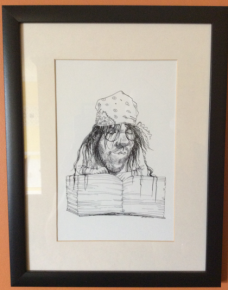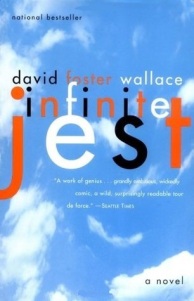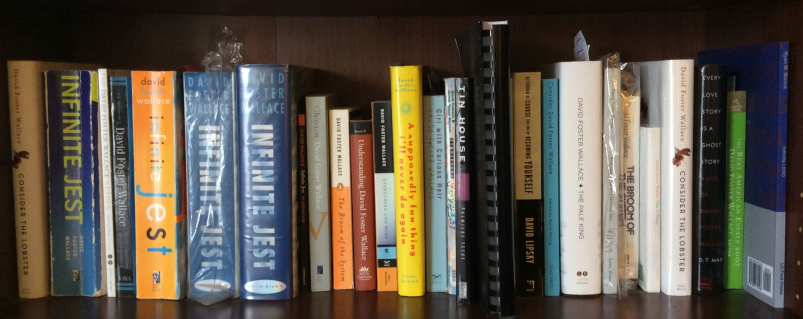You Are In Here: How Infinite Jest Pretty Much Changed My Life

This month marks the twentieth anniversary of David Foster Wallace’s incendiary Infinite Jest. A book described by Spin magazine as “An acidic, free-styling, 1,088-page encyclopedia of hurt.” I want to take a moment to pen a brief essay describing how and why this book is so important to me.
Like most things intellectual in my life, my initial exposure to the book came by way of my father. My dad has always been a man of frightening erudition. Entering into the rarified atmosphere of his condo as an adolescent felt like stepping into a museum: muted colors, hefty tomes, and angular furniture. He is a man of strict routine and spatial consistency (a constellation of traits I share).
He decorated his dining room table with three dessicated pomegranates and whatever book he was reading. The only other items I ever witnessed on the massive wooden slab were whatever culinary accoutrements accompanied our delicious meals (my father is an outstanding cook, a predilection I have yet to pick up). Regardless of change in the outside world, I could always count on hopping into one of those reed-thatched chairs and being greeted by three lumpy pomegranates and a book. Nothing more, nothing less. At the time I wasn’t much of a reader, preferring instead the acidic rage of metal and industrial music. The books, which he swapped out without comment every week or so, rarely interested my adolescent self.
One afternoon in the 90s, however, a large book on the table caught my eye. The cover, an idyllic blue sky dotted with clouds, drew my attention immediately. Something about the color scheme of orange, blue, white, and black was aesthetically irresistible. And the size! The thing looked to be a solid three inches thick.

I took a chance and asked my dad what it was about. He told me it was complicated, that it messed with time and space. He said he wasn’t entirely sure what it was about, something I’d never heard him say before. Sensing the book was one of those tokens of adulthood far beyond my own puerile range, I was intrigued yet skeptical. Would I like it? I asked. My dad paused for a second. You’re not ready, he said. It wasn’t meant as an insult and I didn’t take it as one. I trusted his judgement and immediately forgot about it.
It would take ten years before I remembered that conversation. I found myself in a Barnes and Nobles on a date. Jazzed up on adrenaline and eager to impress, I dragged her into the critical theory section to show off a few of the books I’d recently read for my grad school classes. Then, out of nowhere, popped the memory of that conversation with my dad. I whipped out my cell phone and called him up on the spot.
‘Hey, Dad! Remember that time you had this big book on your table and I asked if I could read it and you said I wasn’t ready?’
‘…’
‘It was really colorful. It had clouds on the cover, I think. And it was big.’
‘Oh, yes. Infinite Jest by David Foster Wallace.’
‘Am I ready now?’
‘… Yes.’
That night I launched myself into the book. It was unlike anything I’d ever experienced before: hyper intelligent, hilarious, and incredibly incredibly sad. I loved the dizzying vocabulary. I kept a vocabulary journal next to my bed and wrote down words like ‘ascapartic,’ ‘homodontic,’ and ‘uremic.’ I struggled to make sense of the multiple plots and the many characters who popped in and out and spoke in radically different voices. I was so confused. And then sometime after the first 300 pages it started to click. Characters began to solidify and the multiple plots started to coalesce. The book asked a lot of me. Its complexity demanded rereads, scribbled down notes, and multiple bookmarks. But oh was it good.
The core of Infinite Jest deals with addiction, depression, and survival. How to hurt. How to survive. How to step outside yourself and resist the narcotizing pull of solipsism, technology, entertainment, and substances. It’s the book I needed to read at that time of my life. I was a full-blown alcoholic polishing off a 12-pack a night. Blackouts became the preferred vehicle for sleep. Days of being flayed alive by self-hatred seemed survivable when I could spend the nights submerged in the numbing slow-death of drink. Although most of me wanted to quit, I didn’t know how.
Infinite Jest, and by extension David Foster Wallace, showed me a way out. The book gave voice to the infantile hurt that propelled me into addiction. Although the entire novel contains too many quotes and lessons and take-aways to mention, the following blockquote has always been one of my favorites. In it, one of the two protagonists struggles to stay sober in the face of extreme pain and readily available narcotics.
He could do the dextral pain the same way: Abiding. No one single instant of it was unendurable. Here was a second right here: he endured it. What was undealable-with was the thought of all the instants all lined up and stretching ahead, glittering. And the projected future fear. . . . It’s too much to think about. To Abide there. But none of it’s as of now real. . . . He could just hunker down in the space between each heartbeat and make each heartbeat a wall and live in there. Not let his head look over. What’s unendurable is what his own head could make of it all. . . . But he could choose not to listen.
This notion that I could endure anything if I broke it down into individual seconds helped me quit alcohol for good. At first, the idea that I would never drink again was too painful for my brain. I couldn’t possibly conceive of a life, much less an entire week, without drinking. I figured out if I just kept putting my next drink off, if I continuously told myself I’d go to 7-11 in another minute, I could abstain. I hunkered down and repeated “just one more second” until it became “one more minute,” “one more hour,” and then “one more day.” Addiction draws much of its power from its simplicity. It doesn’t care about anything other than securing that next fix. By blinding myself and willingly engaging in self-deception I was able to escape.
Although I’m not saying I never would have gotten sober without Infinite Jest, it’s safe to say the book gave me the philosophical and emotional tools necessary to change the direction of my life.
Beyond helping me with addiction, Infinite Jest reminded me just how fun reading can be. David Foster Wallace’s books and interviews helped me understand myself and the world around me. I quickly became obsessed. I bought all his books, joined the David Foster Wallace listserv, travelled to Amherst to read his theses, bought Infinite Jest-inspired clothing, and pretty much talked to anyone in earshot about how amazing he was.

My David Foster Wallace book collection. Signed first editions, advanced uncorrected proofs, readers, etc.
While the book was also instrumental in my reading and writing life, I’ll save that for a later post. It’s the first answer whenever anyone asks one of those desert island ice-breakers so common in the ed/corporate world. It was my litmus test when searching for a mate. It ended up being the book that showed me just how powerful words and ideas can be.
Beautiful and personal piece of writing – thank you for sharing!
LikeLike
Thank you so much for the kind words, Nadine!
LikeLike